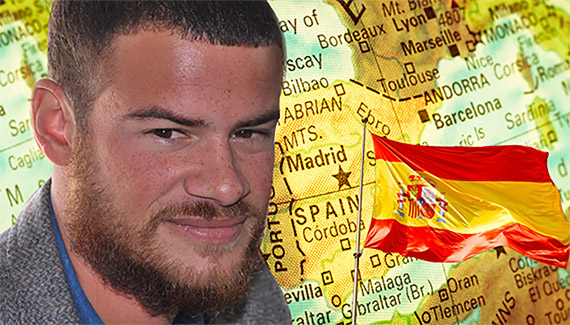
Charles Snyder, a two-time California State University, Dominguez Hills (CSUDH) alumnus, is hoping to enjoy the “fiestas and everything Spain has to offer” during his nine months in the European country as a teacher in the North American Language and Culture Assistants Program.
Snyder (’09, B.A., theatre arts; ’11, M.A., negotiation, conflict resolution, and peacebuilding) arrived in the town of Torre Pacheco in Murcia, Spain, in late September to teach English to 6- to 11-year old children. As a writer and poet who recently was a summer fellow at the VONA Voices writing workshop for writers of color, he also hopes to teach poetry and other types of writing in the cultural immersion program.
“I’d like the kids to be more confident writers after teaching them how to read and write English. I’d like to teach the kids about poetry, working on rhyming sight words or even using simile and metaphor,” said Snyder, who will return in May 2016 to Wilmington, Delaware, where he currently lives in the U.S. “I’d love to start reading poetry to them so they can here poetic cadence–the music of poetry–and teach them the core essentials in hopes that the various elements of poetry may help them become more versed in the English language.”
The North American Language and Culture Assistants Program is an initiative of Spain’s Ministry of Education, Culture and Sport. The program primarily caters to U.S. and Canadian college students and graduates who are native English and French speakers. The program also offers participants the opportunity to assist teachers in a variety of schools in Spain, while learning about Spain’s cultures, customs and history.
Snyder’s interest in writing began as a child writing comic books and he has continued to write “on and off” ever since. He started taking his writing–particularly poetry–seriously about four years ago.
Poetry is a very intimate medium in art. It’s soul-revealing and reflective; it’s war cry and love song. -Charles Snyder
“Poetry is a very intimate medium in art. It’s soul-revealing and reflective; it’s war cry and love song; it’s healing and it’s heartbreak; and it’s hell and heaven. It’s a truth-mirror,” said Snyder. “… People know the difference between sheer-raw honesty and fluff, and poets will bust you out! I love poetry and I also fear it because of that fact. I can’t hide in those lines anymore. I’d risk being a fraud.”
Along with teaching and experiencing Spain’s culture, Snyder is interested in Spain’s more ancient past, such as Moorish culture and its North African roots. He was first exposed to African history and literature by Munashe Furusa, former dean on CSUDH’s College of Arts and Humanities and a past professor and chair of the university’s Africana studies program.
“I didn’t want to have any pre-conceived notions going into Spain, like ‘This is what Spanish culture is.’ I’ve done some research, but I want to learn as I go along,” said Snyder. “I want to also experience Moorish culture outside of the architecture. I want to see if there are any traces from that culture aside from the beautiful structures the Moors built. I’d also like to see if there are communities that still revere their North African roots.”
While in Spain, Snyder would also like to meet prominent literary figures and attend their workshops, explore the artistic community, get “lightly involved” in the country’s politics, and meet historians and “movers and shakers in peace building.”
“The journalists are typically young and the people who know what’s really going on in a country. I’ll focus there first. Then I’ll branch out. I am really looking forward to getting involved with the artistic community, too,” said Snyder. “I think, as Americans, we are raised with certain stereotypes of the outside world, but most of us don’t go outside of our country to see if those stereotypes are true.”